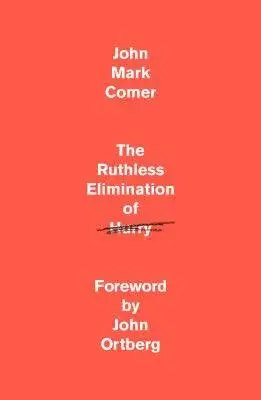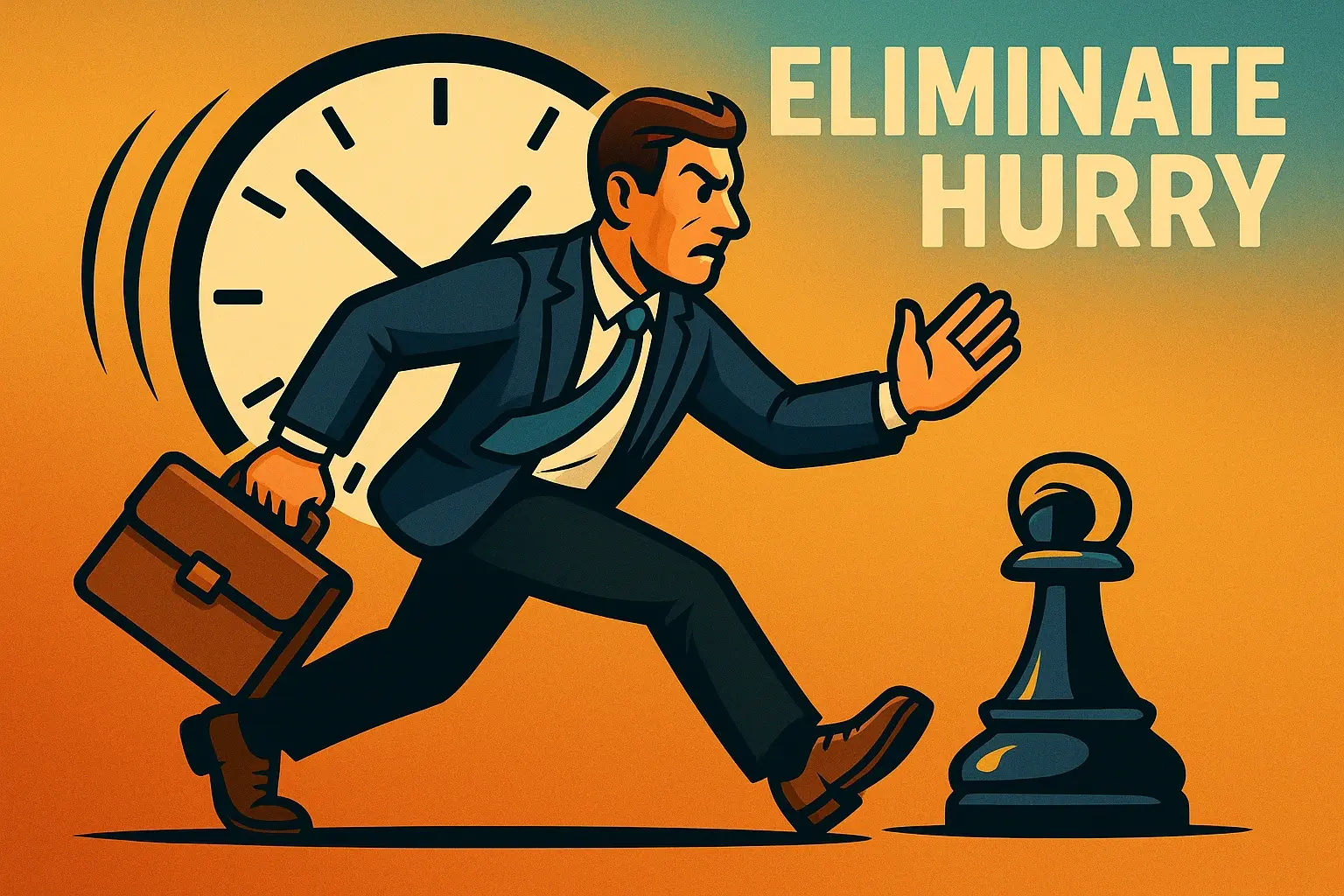
The Ruthless Elimination of Hurry: How to Stay Emotionally Healthy and Spiritually Alive
By John Mark Comer
Published October 4, 2025
John Mark Comer argues that chronic hurry is the defining sickness of modern life— a pace that silently erodes attention, compassion, and spiritual depth. Drawing on ancient practices and modern psychology, he offers a countercultural blueprint: simplify your commitments, curate your inputs, and create rhythms of rest so you can live with presence and joy. The result isn’t less ambition—it’s better ambition, directed toward what actually matters.
Key Lesson
Hurry less so you can love more—and do your best work.
Eliminate Hurry
Book Snapshot
ISBN
9780525653097
ASIN
0525653090
Topics & Search Phrases

Full Summary
The Ruthless Elimination of Hurry is a manifesto for trading frenetic ambition for meaningful presence. John Mark Comer frames the book around an observation that is both obvious and easy to ignore: the speed of life has quietly accelerated beyond human capacity. Notifications fragment attention, work bleeds into evenings and weekends, and “free time” is colonized by screens and side hustles. The result is a steady drift away from the experiences that make life feel rich—deep relationships, unhurried conversations, time to notice what is beautiful, and a sense of spiritual groundedness. We are doing more and enjoying it less.
Comer’s premise is that hurry is not a scheduling problem; it is a heart and identity problem that shows up on our calendars. When worth is tied to output, speed becomes a moral imperative. You feel guilty for resting, suspicious of slowness, and anxious when you are not “getting ahead.” The hurried life, he argues, is incompatible with love. Love is patient and requires attention. Hurry makes you irritable, easily offended, and emotionally unavailable—the opposite of the person you want to be for the people you love.
The book combines biography, pastoral wisdom, and practical habits. Comer admits he learned this lesson the hard way: as responsibilities grew, he tried to scale himself with longer hours and more commitments, until exhaustion and cynicism forced a reckoning. What followed was a deliberate redesign of his life around a few countercultural practices—simplicity, silence and solitude, Sabbath, and slowing—that restore attention and joy. These practices are not about withdrawing from the world. They are about moving through it at a human pace, with a quiet center that can notice, choose, and love.
Simplicity starts with ruthless subtraction. Make a list of everything that costs time and attention: apps, social feeds, committees, subscriptions, obligations, late-night scrolling, even well-meaning favors. Then sort by value. Anything that does not clearly serve your deepest commitments becomes a candidate for pruning. Simplicity is not minimalism-as-aesthetic; it is minimalism-as-ethic: fewer inputs so the important ones can breathe. Practically, this looks like: turning off nonessential notifications, moving distracting apps off the home screen, setting app timers, batching errands, and choosing a “good enough” standard for chores and inboxes. The goal is margin—space to think, rest, and respond rather than react.
Silence and solitude are how you defragment your inner world. In quiet, you can feel what you’ve been outrunning: sadness, fatigue, resentment, fear. The point is not to wallow but to metabolize. Even 10–20 minutes each morning—phone in another room—can reorient your day. Comer recommends keeping a simple chair or corner where you go to be still. Notice the impulse to fill every gap with input; resist it. Over time, you will recover the basic human skill of being alone with your own thoughts without immediately escaping into stimulation.
Sabbath is the practice that protects all the others. One day each week, stop trying to make life “work.” Power down devices. Prepare meals ahead of time. Do things that feel like rest and delight: long walks, lingering conversations, shared meals, napping, reading for joy. The point is not strict rule-keeping; it is reclaiming the freedom to exist without performing. In a culture that rewards constant availability, setting this boundary is an act of courage. The surprising effect is that work days become more focused because they are framed by a regular exhale.
Slowing is the everyday art of moving at the speed of love. Comer suggests small experiments: drive the speed limit in the slow lane, choose the longest line at the store and practice patience, eat without a screen, single-task your work, and schedule buffer between meetings. These micro-habits retrain your nervous system to tolerate quiet and delay. The reward is subtle but real: you notice your spouse’s mood shifts, your child’s question, the way light falls across the table. You become easier to be around.
Importantly, the book refuses false binaries. It does not ask you to choose between ambition and peace, excellence and rest, productivity and presence. It argues that a deeper kind of excellence flows from rested attention. When you are grounded, your work improves: you make fewer reactive decisions, you communicate more clearly, and you choose projects that align with your values. Boundaries do not shrink your life; they shape it so your best energy goes to the right places.
The final chapters wrestle with practical obstacles. What if your job demands constant urgency? Start by reclaiming what you can control: your morning and evening routines, device settings, email habits, and how you use breaks. Share the why behind your boundaries with your team; peers often respect clarity even if they cannot adopt the same rhythms. What if relationships pressure you to stay hurried? Then boundaries become acts of love: “I want to be present with you, and that means I can’t say yes to everything.” What about seasons of unavoidable intensity— deadlines, caregiving, crises? Then name it as a season, set a clear end date, and plan a genuine recovery on the other side. Hustle is survivable; endless hustle is corrosive.
Underneath the tactics is a vision of freedom. Hurry promises more life while delivering less. The practices in this book gently reverse the equation. As you simplify, you gain back attention. As you rest, you regain joy. As you slow, you recover the ability to love. None of this is instant. It accumulates like compound interest through small, consistent choices. Over months and years, you look up and realize that your calendar reflects your values, your body is less tense, your relationships have more laughter, and your work has more meaning. That is the point—not to do less for its own sake, but to be more fully alive for the things and people that matter most.
See also: The Ruthless Elimination of Hurry: How to Stay Emotionally Healthy and Spiritually Alive, Craft a Self-Management Dashboard to Run Your Week Like a CEO, Create a Self-Coaching Framework for Better Everyday Decisions
Key Takeaways
- Hurry is incompatible with love; attention is your scarcest resource.
- Design for margin: prune low-value inputs to protect focus and joy.
- Practice silence, solitude, Sabbath, and slowing to retrain your pace.
- Boundaries are acts of love—for others and yourself.
- Excellence flows from rested attention, not constant urgency.
- Treat busy seasons as temporary; plan recovery on the other side.
- Single-task important work; batch shallow tasks to reduce context switching.
- Use small experiments (slow lane, long line, no-phone meals) to cultivate patience.